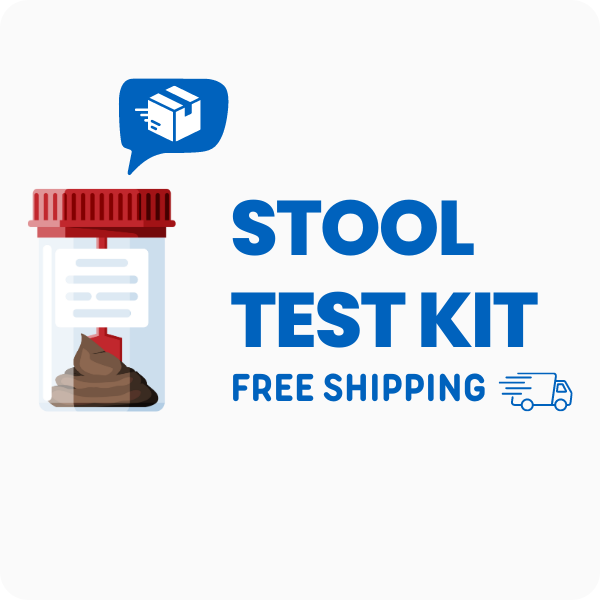Ordering the Secretory IgA Stool Test by Doctor’s Data
Secretory IgA is a key immune protein found in the gut, helping to protect the digestive tract from harmful bacteria, viruses, and allergens. Testing this marker can help identify imbalances in gut immunity that may be linked to digestive discomfort, frequent infections, or food reactions. Interestingly, low levels of secretory IgA can sometimes be seen in people under chronic stress, as stress hormones can suppress immune function in the gut.
Ordering this test can help you:
- Pinpoint if your gut immune system is underactive or overactive
- Identify possible links between gut immunity and symptoms like bloating, diarrhea, or skin rashes
- Track changes in gut immunity after starting probiotics or dietary changes
- Support targeted treatment for chronic digestive issues
- Monitor immune response in people with autoimmune or inflammatory conditions
Who Should Consider Gut Immunity Testing
People who have ongoing digestive problems, such as frequent bloating, loose stools, or unexplained skin rashes, may benefit from this test. For example, someone who has tried different diets and supplements but still struggles with stomach pain and food sensitivities might find that checking their gut immune marker provides new answers.
Ordering this test may also be helpful in these situations:
- Recurring sinus or respiratory infections that do not improve with standard care
- Children with eczema or unexplained skin rashes
- People with celiac disease or Crohn’s disease who want to monitor gut immune activity
- Those with chronic fatigue and suspected Candida overgrowth
- Unexpectedly, people experiencing high stress at work or home, as stress can lower gut immune markers
Testing this marker can help reveal if your gut’s immune defense is working as it should, which can guide more focused treatment for digestive and immune-related symptoms. Delaying this test may mean missing early signs of gut immune imbalance, which could make it harder to address symptoms quickly.
Preparing for Digestive Immune Marker Testing
Fasting is not needed for this stool test, but be sure to follow the specific instructions included in your test kit for the best sample collection. Always go by any directions your doctor or healthcare provider gives you, as following these steps helps ensure your sample is handled correctly and your results are as useful as possible.
Labs Included When Ordering Your Secretory IgA Stool Test by Doctor’s Data
| Test Name | Reference Range | What This Marker Means | Low and High Levels of Secretory IgA |
|---|---|---|---|
| Secretory IgA | 510 – 2040 | Secretory IgA is the main immune protein in the gut, helping to protect the lining from bacteria, viruses, and allergens. It acts as a first line of defense in the digestive tract. |
High levels mean your gut immune system may be reacting to infection, inflammation, or food sensitivities.
Low levels mean your gut immune defense may be weakened, making it harder to fight off germs and possibly linked to chronic stress or immune deficiency. |
Secretory IgA FAQ
Is there Secretory IgA testing near me?
This is a home test kit, so you can collect your sample locally and send it to the lab—no need to travel. For those with ongoing digestive symptoms, being able to collect your sample at home makes it easier to get tested quickly and comfortably; check the draw location link at the top of the page for more details.
How do I interpret the test results?
While your treating doctor should help you understand your results, we also offer a one-on-one test results review with our clinical team to help you make sense of your results and next steps.
What is the cost of the test?
The price you see for this test includes standard shipping to you and back to the lab, though draw fees may apply. Testing can help you find out if your gut immune system is part of your symptoms, which may help you get better faster.
How often should I retest?
Retesting is usually recommended every 3 to 6 months, especially if you are making changes to your diet, supplements, or treatment plan. This helps track your progress and see if your gut immune marker is improving or if further changes are needed.
How accurate is the test?
This test uses enzyme-linked immunosorbent assay (ELISA) to measure secretory IgA in stool, with a specificity of 98% and sensitivity of 97%. TrueHealthLabs.com partners with CLIA-certified and CAP-certified laboratories to uphold rigorous testing standards for dependable results.
Important Notes
- The test cannot be collected and mailed from New York state. Contact us with questions
Medical Review Board
Reviewed by Jeff Donohue M.D. from Body Logic and Brady Hurst DC, CCCN. Written by True Health Lab’s team of editorial health contributors.
Disclaimer: This information is for educational purposes only and not intended as medical advice. Consult your healthcare provider for personalized guidance.
Why Customers Trust True Health Labs - What People are saying
Also rated 4.6 out of 5 based on 3452 ShopperApproved reviews- See all TrueHealthLabs.com reviews.







